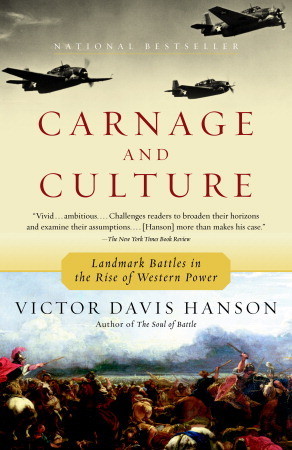Dispensing
with more static explanations of Western hegemony such as technological or
ecological determinism, Victor Davis Hanson adeptly tenders a cultural argument
that enables a more complex appreciation of the variety and change that have
characterized military thought, practice, and institutions over thousands of
years. Granted, the alternative accounts of such prominent scholars as Jared
Diamond, Fernand Braudel, and Charles Beard represent significant contributions
in concretely rationalizing the ascendancy of the West; yet, these variables
are necessary, but not quite sufficient pieces of the puzzle of Western
cultural dominance. As for ecological explanations, it suffices to say that few
civilizations were situated more disadvantageously than Greece. With respect to
the technology-driven thesis, Hanson co-opts much of its strength by explaining
technological superiority as having a causal relationship with certain Western
cultural attributes; and, many landmark battles like Salamis and Midway
featured a technological stalemate (even a Western disadvantage in technology
at times) with cultural variables such as the status of freedom, individualism,
and civic militarism among the opposing forces. Additionally, there were really
only a handful of watershed advances in military technology ranging from the
breeding of horses specifically for war and the transition from bronze to iron
to the refining of gunpowder and even a historical event as seemingly crucial
as the Industrial Revolution has been described by many ultimately as “a tide
that raise[d] all boats.”
Despite
the strength of the cultural approach in terms of its analytic utility and
explanatory power, Hanson’s overarching thesis that seeks to explain the
politico-military dominance of the “West”[1]
over and against “the Other” over a continuous period of the last 2,500 years
suffers from problems regarding continuity, uniqueness/universality,
reductionism, and essentialism. In other words, the cultural approach is still
superior to the aforementioned alternative theories, but Hanson falls prey to
the tendency toward causal generalizations and linear postulates that even he
cautions against by encouraging his readers to not “judge the Western military
record in absolute terms, but always in a relative context vis-à-vis the
conditions of the times.” Hanson’s prioritization of a rigid conceptual
framework that omits or distorts any information that does not fit conveniently
within its preconceived, strictly delineated boundaries is a grave historical
solecism. In addition to such cherry picking of information, Carnage and Culture exemplifies the
penchant for describing present social behavior in terms of past institutions
and practices too much and thus exemplifies spurious continuity.[2]
Hanson himself acknowledges the tendency for historians to regard such a strong
thesis with a certain degree of skepticism and tries to dispel this sentiment
with a disclaimer in the preface of Carnage
and Culture that “[it] is not a book…written for academic specialists.” But,
for the student of history, such a disclaimer does not insulate his work from
the burden of historical specificity.
***Citations Omitted
[1] Hanson dismisses some of
the debate surrounding his definition of “Western” by acknowledging that not
all European states had exactly the same values and that institutions and
practices have indeed evolved to some extent. However, the adequacy of this attempt
to avoid criticism on this front is outside the scope of this paper and as
Hanson states, “I have no interest in entering in such contemporary cultural
debates, since my interests are in the military power, not the morality, of the
West.”
[2] See Norman Jacobs’ The Sociology of Development (1966) for a more in-depth discussion of the
tunnel-vision style tendency to explain present behavior strictly in terms of
past institutions and practices and exemplify spurious continuity and
vice-versa.

No comments:
Post a Comment